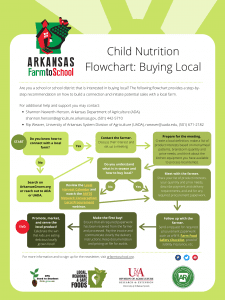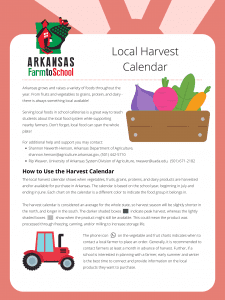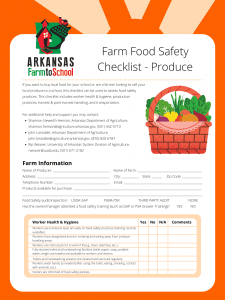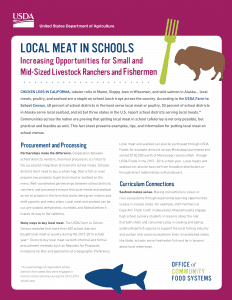Schools – How to Buy Local
Schools – How to Buy Local
Schools, early childhood education facilities, and alternative learning environments have the opportunity to serve local foods to students as part of their farm to school program. Local foods can be served in the classroom, cafeteria, or other locations depending on the structure of the learning environment. Schools could serve a local harvest meal using local rice, sweet potatoes, peaches, beef, and dairy, all grown or processed in the state of Arkansas!
The Arkansas Legislature defines local food as food products that are grown in Arkansas and/or packaged and processed in Arkansas. This definition comes from the Local Food, Farms, and Jobs Act.
For schools interested in purchasing local but not sure how to start, check out the Child Nutrition Flowchart that walks you through the first steps. Another important resource to review is the Local Harvest Calendar, which provides information on when vegetables, fruit, grains, protein, and dairy are in season throughout the year in Arkansas. Visit the USDA Procuring Local Foods for Child Nutrition Programs Guide for a more comprehensive overview of federal procurement principles and information related to sourcing and procuring local products while adhering to federal regulations!
The next steps are to create a definition of what local means to your school, learn how to buy local foods, and make a purchase.
Create a Local Definition
For schools interested in purchasing local but not sure how to start, a first step can be the development of their definition of local.
The USDA does not define local food, so schools have the opportunity to craft their own definition depending on their unique geography, climate, and abundance of local food producers and manufacturers. Many schools define local as within a certain number of miles from the school, within the county, or within the state. Local also does not have to be bound by the state’s borders. If your school is an area that is close to the borders of Texas, Oklahoma, Missouri, Tennessee, Mississippi, or Louisiana, buying from farmers in those states could also be determined to be local by definition.
School can use the state’s definition of local as defined by Arkansas Legislature from the Local Food, Farms, and Jobs Act. The Act defines local food as food products that are grown in Arkansas and/or packaged and processed in Arkansas.
Learn How to Buy Local
Next, schools need to know how to purchase locally. Procurement methods need to be followed in accordance to regulations.
As part of the Arkansas Farm to School Network Conversations, Ally Mrachek from Fayetteville Public Schools led a discussion on local procurement. She discusses how to buy local using the micro-purchase level, an informal bid (3 bids and a buy), and a formal bid.
It is recommended that schools start small! Start with purchasing one local item, using the micro-purchase level if the total is under $10,000 per school year, and test out the experience. Survey the students and staff, get input from the school community, and discuss ways to improve the experience. A great time to buy local is in October during Arkansas Farm to School Month. Many schools will also be buying local food, offering farm to school classroom activities, and growing their gardens.
Now, schools can decide whether they would like to purchase local food directly from a local Arkansas farmer or indirectly through a distributor or food hub.
Direct
When schools buy directly, they purchase foods from nearby farmers, processors, and producers. Information on where to find local foods can be found on the Arkansas Grown website. The Arkansas Grown program, administered through the Arkansas Department of Agriculture, began in 2012 to help promote the many agricultural products that are grown here in Arkansas. The program is often used to help make the critical connection between producers and consumers. Search for local producers on the Arkansas Grown website.
A great handout to use when purchasing local from a farmer is the Farm Food Safety Checklist – Produce. As a school, you may decide to ask farms to complete the checklist so that you are aware of their farm and growing practices. Schools can also buy local meat to serve to their students. The USDA Local Meat In Schools resource provides information on buying local meat.
Another way to purchase directly from farmers is through a farmers market. Arkansas is home to many seasonal farmers’ markets. The Farm to School and Early Childhood Education Program at the Arkansas Department of Agriculture, in collaboration with the Arkansas Coalition for Obesity Prevention and the Arkansas Farmers’ Market Association, developed a resource to map farmers’ market locations throughout the state. While the high season for farmers’ markets does not line up perfectly with the school year, they can still provide an opportunity for schools and child nutrition directors to create connections with local farmers and producers. Additionally, farmers’ markets provide a good chance for early childhood education facilities to buy smaller volumes of locally grown fruits and vegetables from small to medium-sized producers to use in taste tests or to serve in meals to their students.
The Arkansas Farmers’ Market Association Facebook page is also a good place to find updates and information from markets across the state.
Indirect
When schools buy indirectly, they purchase local through a wholesaler or broadline distributor. Increasingly schools are including expectations about local sourcing in their contracts with food service management companies and/or distributors. Even without contractual obligations regarding local, many distributors already offer local products and can provide that information when placing orders. This approach is an easy way to bring local products into schools without creating separate distribution channels.
Local Procurement Resources
Click the links below to find local producers near you.
Arkansas Grown

The Arkansas Grown program is administered through the Arkansas Department of Agriculture to help support and promote the many agricultural products that are grown in Arkansas and the farmers and producers who grow them.
Arkansas MarketMaker

The MarketMaker Partners Network is a growing partnership of Land Grant Universities, Departments of Agriculture, and food and agricultural organizations investing in a coordinated effort to build a virtual infrastructure that connects businesses throughout the food system with one another and brings healthier, fresher, and more flavorful food to the average consumer.
Arkansas Local Food Network

Arkansas Local Food Network is a 501c3 non-profit organization supporting farm viability through direct marketing since 2007.





